Dairy farm owners across the state reel from setback, as cattle haven’t been fed in two days and suppliers refuse to deal in the old Rs 500 and Rs 1,000 currency notes; demonetisation will soon start affecting milk supply to cities
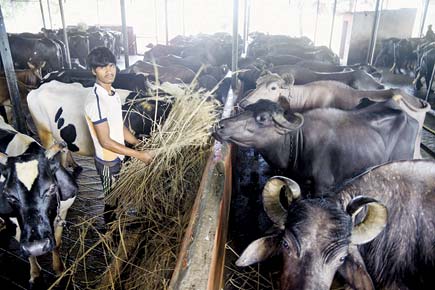
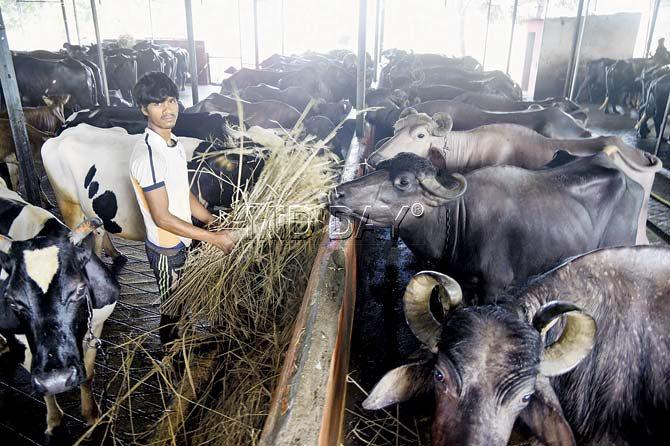
Popular Dairy Farm at Padgha. Pic/Sameer Markande
The demonetisation drive is starting to affect the animal kingdom too. To be particular, consider John Kokkat — proprietor of the Popular Dairy Farm in Bhiwandi district with cattle totalling 156 animals (10 cows and 146 buffaloes), which provide 900 litres of milk per day collectively — who worries they may not survive the demonetisation. Instead, with no fodder to feed them, they may soon just be dead meat.
ADVERTISEMENT
Also Read: Mumbai food joints notice drop in customers, incur loss
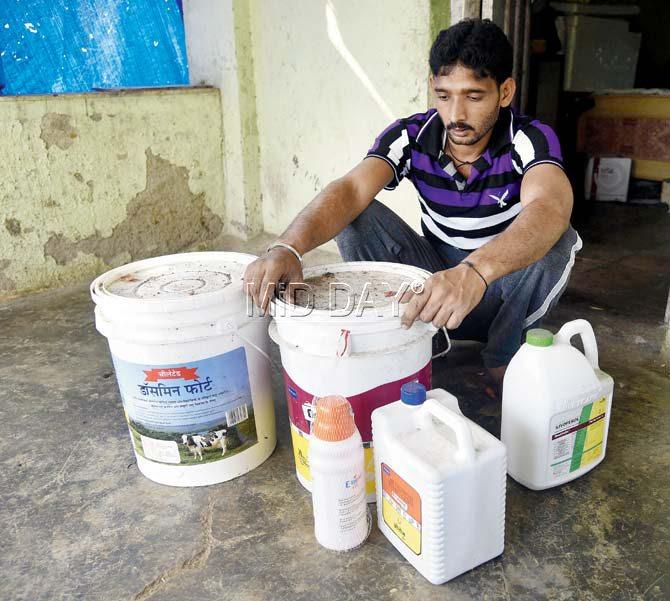
Irfan Bhasir with the supplement feed needed
Kokkat is not sailing alone on that boat. Other small- and medium-run dairy farms in villages like Padgha, Khosimibi, Bokri, Dohole, etc, around Bhiwandi district are also feeling the pinch of the cash crunch as the fate of around 50,000 cattle hangs in the balance. Together, they supply nearly 3.4 lakh litres and 10,000 litres of buffalo and cow milk respectively to Mumbai, Thane and Bhiwandi.
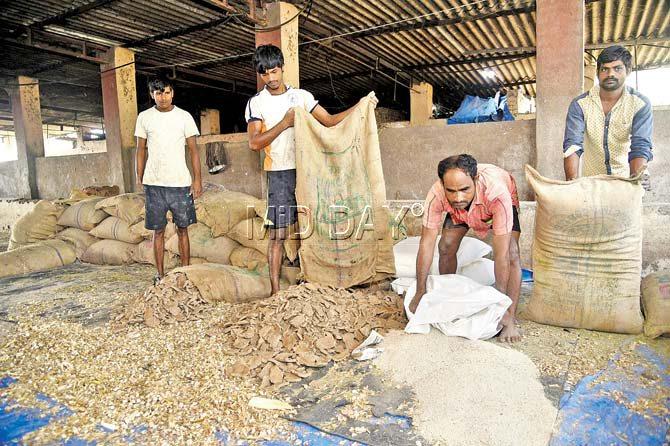
Workers at a farm sorting the feed
The feed conundrum
Most farm owners ensure that the cattle are not given mere fodder, but supplemented with special feed that consists of coconut and cotton cakes along with skin of pulses like tur, moong, corn, sugarcane waste to ensure ‘top quality’ milk.
Read Story: Demonetisation: At KEM, abusive civic staff make hay even as patients suffer
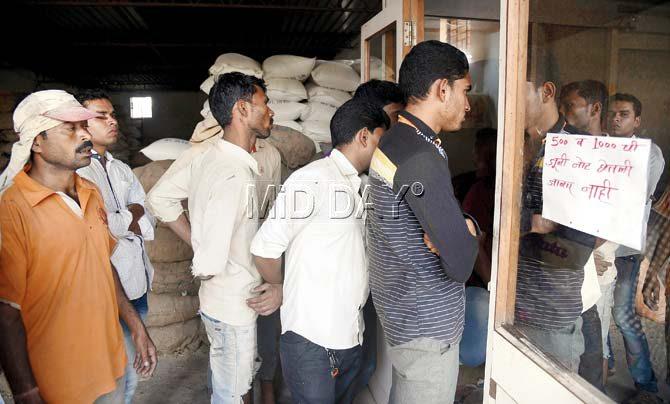
Samarth Godown has a notice announcing that old currency will not be accepted
“We have to milk the cattle twice a day and I don’t want to dilute it by mixing water,” said Kokkat. However, he faces a double-edged sword. First, he is worried that he doesn’t have enough legal tender to afford the special feed. “I have enough money to pay for the coconut cakes, but it is in the old Rs 500 and Rs 1,000 notes. I also have over Rs 7 lakh stuck in the market. I need to pay my creditors and labourers, but as I could not deposit cash, two of my cheques to the feed supplier have already bounced and I had to plead for a few bags of feed. No supplier can accept these defunct notes,” he said.
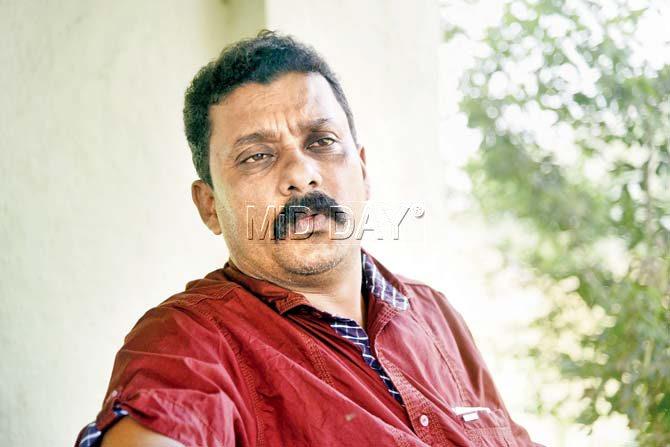
Secondly, since most regular customers pay on a bi-monthly or monthly basis, even the cash flow from that end has stopped. “We have fixed customers and most of them are willing to clear their dues by paying us in the old currency, which is of no use to me,” added Kokkat.
Stock for two more days
Now, despite government assurances that the situation will return to normal within a week, with no sign of the woes abating, most dairy units that still do have some feeding stock, say it will only last two to three days more as each buffalo requires at least 5 kg feed daily along with the supplements. “The feed we have at present will last only for two days. And until we clear the last bill, no trader will supply further stock,” said the dairy owner.
Time constraints
Once milked, as it’s a perishable commodity, it has to reach suppliers within a two-hour window. “I have to clean the stables, milk the animals and then get the supplies to the market. I do not have the time to stand in these long queues to exchange money,” said, another dairy owner Irfan Bhasir Theli of Bokri village, who has 60 buffaloes and has not given them feed for last two days.
Another farmer from Titwala, Nilesh Gharat, who owns 12 buffalos and had to arrange for the new Rs 2,000 currency to finally get feed, said, “I had come to Padgha two days ago, but had to return without the feed as I only had the old currency. Without the feed, we will lose both the cattle and our customers, so I somehow had to arrange for the new denominations.”
Hoarding concerns
Add to that growing concerns that hoarding in the midst of demonetisation could render acquiring feed for the cattle almost impossible. “We appeal to the government to ensure that there should be no hoarding or hike in price of feed, wherein a few traders might try to cash in by taking undue advantage of the situation. Else, small dairy units will be forced to shut down,” said Kokkat.
From the trader’s end Sanjay Sonar (35), proprietor of Samarth Trading, a supplier of cattle feed, has pasted a notice board in his godown cum office in Padgha: Rs 500 and Rs 1,000 currency notes are not accepted. Speaking to mid-day, Sonar said, “I have stock in my godown for next week, and I can only place order for feed from the wholesalers, provided I have cash in hand. Two cheques worth Rs 90,000 have already bounced, few more cheques need to be deposited, and I am not sure if those will clear.”
When asked about the risk of hoarding, Sanjay admitted that rich traders will stock all materials in their godown, creating an artificial shortage of feed, which is bound to shoot up the price.
The situation at Padgha weighing bridge was equally grim, laden with over flowing hay from the trucks. Kalpesh Nichite, a trader from
Sahapur said, “We collect the hay from farmers at Rs 8 to Rs 15 per bundle and with the help of six daily workers. Now, the weighing bridge has stated they won’t be taking the old currency so the traders and dairy owners are forced to keep bills pending. It is a chain reaction and we all are suffering.”
 Subscribe today by clicking the link and stay updated with the latest news!" Click here!
Subscribe today by clicking the link and stay updated with the latest news!" Click here!







